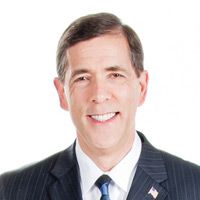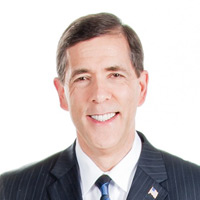The Challenge of Financing Health Care in Retirement
Invest in your health as you would in your 401(k): Do it automatically and stick with a plan.

Profit and prosper with the best of Kiplinger's advice on investing, taxes, retirement, personal finance and much more. Delivered daily. Enter your email in the box and click Sign Me Up.
You are now subscribed
Your newsletter sign-up was successful
Want to add more newsletters?

Delivered daily
Kiplinger Today
Profit and prosper with the best of Kiplinger's advice on investing, taxes, retirement, personal finance and much more delivered daily. Smart money moves start here.

Sent five days a week
Kiplinger A Step Ahead
Get practical help to make better financial decisions in your everyday life, from spending to savings on top deals.

Delivered daily
Kiplinger Closing Bell
Get today's biggest financial and investing headlines delivered to your inbox every day the U.S. stock market is open.

Sent twice a week
Kiplinger Adviser Intel
Financial pros across the country share best practices and fresh tactics to preserve and grow your wealth.

Delivered weekly
Kiplinger Tax Tips
Trim your federal and state tax bills with practical tax-planning and tax-cutting strategies.

Sent twice a week
Kiplinger Retirement Tips
Your twice-a-week guide to planning and enjoying a financially secure and richly rewarding retirement

Sent bimonthly.
Kiplinger Adviser Angle
Insights for advisers, wealth managers and other financial professionals.

Sent twice a week
Kiplinger Investing Weekly
Your twice-a-week roundup of promising stocks, funds, companies and industries you should consider, ones you should avoid, and why.

Sent weekly for six weeks
Kiplinger Invest for Retirement
Your step-by-step six-part series on how to invest for retirement, from devising a successful strategy to exactly which investments to choose.
Many people ignore the impact health care costs will have on their nest eggs as they age. In fact, only 12% of working Americans have taken any steps toward addressing medical expenses in retirement, according to a study cited in HealthView Services' 2016 Retirement Health Care Costs Data Report.
There's a reason for people's lack of concern. Most have gotten used to having an employer pick up some percentage of the cost of their medical insurance premiums; it's been a company benefit they've counted on forever. They have no idea what the burden will be when they're left to foot the premiums on their own, perhaps because they chose to retire early or because they were a victim of downsizing.
And the result is some serious sticker shock.
From just $107.88 $24.99 for Kiplinger Personal Finance
Become a smarter, better informed investor. Subscribe from just $107.88 $24.99, plus get up to 4 Special Issues

Sign up for Kiplinger’s Free Newsletters
Profit and prosper with the best of expert advice on investing, taxes, retirement, personal finance and more - straight to your e-mail.
Profit and prosper with the best of expert advice - straight to your e-mail.
Take, for example, a married couple in their late 50s or early 60s, who because of their age have health issues that make it necessary to choose a more comprehensive—and, therefore, more expensive—health insurance plan.
It's probably going to cost them about $18,000 a year—an expense they didn't plan for and isn't in their budget.
Think Medicare will save them when they reach 65? Think again. According to that same 2016 report, the total projected health care premiums (Parts B, D and supplemental insurance) for a healthy 65-year-old couple retiring this year are expected to be $288,400 (in today's dollars) over their lifetime. Factor in the out-of-pocket expenses such as deductibles, copays, hearing, vision and dental, and the cost goes up to $377,412. For someone who is now 55, that cost will be closer to a half-million dollars.
So the conversation becomes, "By the way, Mr. and Mrs. Client, do you happen to have $400,000 or $500,000 lying around that you can use to take care of these costs?" In a lot of cases, they haven't even saved $500,000!
What can they do about it? Well, for one thing, they can take better care of themselves. The last thing you want, after you've worked hard all your life to accumulate savings, is to have your health be a hindrance on your ability to enjoy your retirement.
People invest systematically toward their future finances—they consult with a financial professional and put money away every paycheck. Think about it: The automatic investments into a 401(k) happen no matter what, and these deposits slowly compound over time into a large sum of money. This is called the compound effect.
The same strategy works for investing in your health: You should automatically take your vitamins and commit to an exercise plan. Of course you won't see results right away, but the compound effect of these good habits will have a profound impact on your health in retirement. The problem is a lot of people ignore investing in their wellness, and it slowly compounds in a negative way.
Of course, medical costs will come up for even the healthiest of people and need to be planned for, including those dreaded long-term care costs. Very few people are planning for that—maybe one out of four—which means most people will cover those expenses themselves when the time comes. And that money will come dollar for dollar out their portfolio.
Even those who purchased a long-term care insurance plan while they were young are at risk of eventually being priced out, because the premiums are going up so quickly.
So again, it comes down to creating a plan. There are alternatives to LTC insurance, such as long-term care savings accounts. There are insurance policies that can provide additional cash flow in the event of a long-term care situation. And if you don't qualify for life insurance, there are annuities with optional riders, generally associated with an additional cost, that can help you offset the costs of long-term care expenses.
It's an area of financial planning that a lot of professionals gloss over while they focus on investments or converting your 401(k) to a Roth IRA.
But the hole at the bottom of the bucket for most retirees is this health care issue.
That means working on your weight, cholesterol, blood pressure, etc., as well as your retirement plan, at the same time.
Richard W. Paul is the president of Richard W. Paul & Associates, LLC, and the author of "The Baby Boomers' Retirement Survival Guide: How to Navigate Through the Turbulent Times Ahead." He is an Investment Adviser Representative and insurance professional.
Kim Franke-Folstad contributed to this article.
Profit and prosper with the best of Kiplinger's advice on investing, taxes, retirement, personal finance and much more. Delivered daily. Enter your email in the box and click Sign Me Up.

Richard W. Paul is the president of Richard W. Paul & Associates, LLC, and the author of "The Baby Boomers' Retirement Survival Guide: How to Navigate Through the Turbulent Times Ahead." He holds life and health insurance licenses in Michigan and Florida and is a Certified Financial Planner, Registered Financial Consultant, Investment Adviser Representative and insurance professional.
-
 Tariffs: An Uninvited Valentine's Day Guest
Tariffs: An Uninvited Valentine's Day GuestExpect to pay more for flowers and chocolates this year or find creative alternatives to save on Valentine's Day without looking cheap.
-
 Should I sell my silverware and gold jewelry now that prices are high?
Should I sell my silverware and gold jewelry now that prices are high?My family silver and gold have sentimental value, but I hardly use them. Should I sell? We asked a professional metals dealer and investment adviser to weigh in.
-
 One Country Just Pushed the Retirement Age to 70. Is the US Next?
One Country Just Pushed the Retirement Age to 70. Is the US Next?These countries have the highest and lowest retirement ages in the world — but that doesn’t give the full picture of which is best and worst for retirement.
-
 Inherited an IRA? Don't Fall Into the 10-Year Tax Trap
Inherited an IRA? Don't Fall Into the 10-Year Tax TrapRules on inherited IRAs have tightened, and most non-spouse beneficiaries must empty the pot in 10 years or face stiff penalties. That calls for an action plan.
-
 I'm a Retirement Psychologist: This Is Why a Supportive Marriage May Matter More Than Money in Retirement
I'm a Retirement Psychologist: This Is Why a Supportive Marriage May Matter More Than Money in RetirementIn retirement, health is as important as finance. And research shows people in supportive marriages have fewer issues with weight, metabolism and self-control.
-
 How Money Guilt Holds Women Back (and How You Can Send It Packing)
How Money Guilt Holds Women Back (and How You Can Send It Packing)Women shouldn't let guilt limit the way they manage their hard-earned wealth. It's time to separate emotion from financial decision-making.
-
 Don't Bury Your Kids in Taxes: How to Position Your Investments to Help Create More Wealth for Them
Don't Bury Your Kids in Taxes: How to Position Your Investments to Help Create More Wealth for ThemTo minimize your heirs' tax burden, focus on aligning your investment account types and assets with your estate plan, and pay attention to the impact of RMDs.
-
 Are You 'Too Old' to Benefit From an Annuity?
Are You 'Too Old' to Benefit From an Annuity?Probably not, even if you're in your 70s or 80s, but it depends on your circumstances and the kind of annuity you're considering.
-
 In Your 50s and Seeing Retirement in the Distance? What You Do Now Can Make a Significant Impact
In Your 50s and Seeing Retirement in the Distance? What You Do Now Can Make a Significant ImpactThis is the perfect time to assess whether your retirement planning is on track and determine what steps you need to take if it's not.
-
 Your Retirement Isn't Set in Stone, But It Can Be a Work of Art
Your Retirement Isn't Set in Stone, But It Can Be a Work of ArtSetting and forgetting your retirement plan will make it hard to cope with life's challenges. Instead, consider redrawing and refining your plan as you go.
-
 For the 2% Club, the Guardrails Approach and the 4% Rule Do Not Work: Here's What Works Instead
For the 2% Club, the Guardrails Approach and the 4% Rule Do Not Work: Here's What Works InsteadFor retirees with a pension, traditional withdrawal rules could be too restrictive. You need a tailored income plan that is much more flexible and realistic.